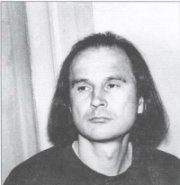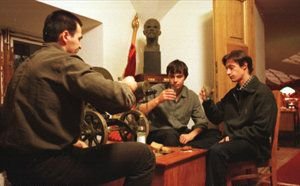Aleksei Balabanov essentially
recreates the Stalinist narrative paradigm in his film Brother 2. The villain
plot—one of the typical Stalinist master plots—of the film creates
the general framework into which such quintessential socialist realist elements
as narodnost' and klassovost'. The film traces the solitary battles of
Danila—the main character and positive hero—through the mafia-ridden
world of Moscow and all the way to Chicago, where he wages his final battle
against an American businessman whom he blames for the murder of his friend.
Danila's motivation stems from his desire to rid Russia of villainous powers
which reek havoc against the common Russian people-the narod. His repetition
of the patriotic poem, which he first hears orated by Belkin's (played by
Sergei Makovetskii) young son, that evokes Russia as the homeland and the Russian
people as a family becomes something of a new socialist realist mantra for the
21st century.
The film has attracted enormous attention, both positive and negative. Dimitrii
Piorunskii at the New York festival of Russian film in the fall commented that
the filmmakers union felt uneasy because Brother 2 is, in fact, an anti-American
film. This comment is really quite shortsighted; first, there are plenty of
non-American villains in the film; second, and more importantly, the film is
highly nationalistic, which, it seems, has been confused with anti-Americanism.
Other critics of the film point to its overt racism, its indiscriminate killing
(always by Russians), and the plot's numerous weak moments. Mark Lipovetskii
in a response to the film published in Iskusstvo Kino wonders just what role
Irina Saltykova and the American woman, who pities Danila and takes him to her
home, are supposed to play in the film. While the situations created around
these characters are largely improbable, there is more of point to their inclusion
than Lipovetskii suggests. Both Saltykova and the American women are wealthy
television personalities. They, unlike Dasha the prostitute with the shaved head,
or Ben the happy-go-lucky truck driver that helps Danila out on two occasions,
are not part of the narod; they do not represent average, working class people.
As Danila makes clear, those who believe that there is power in money are mistaken.
Thus, their status is problematized, though not villainized. In this very macho
film, villains and heroes are men; women play secondary roles.
This film is highly energetic and entertaining. While, on one hand, it is entirely
new in its approach to Russian film, on the other hand, by incorporating visual
images and themes from Stalinist cinema, Brother 2 cleverly maintains certain
Soviet traditions in post-Soviet Russia.
| 
Aleksei Balabanov was born in Sverdlovsk on February 25,
1959. Balabanov made his directorial debut in 1989 with the documentary
Egor and Nastia. His first feature film, Happy Days,
was released in 1992 and won instant fame across Europe. Since, he has
directed The Castle (1994), Brother, (1997), and Of
Freaks and Men (1998). Balabanov presently works at STV Film Company
in St. Petersburg.
|

